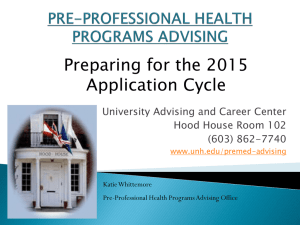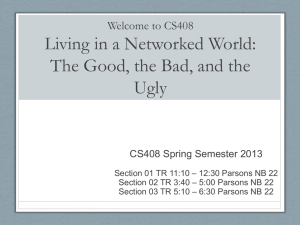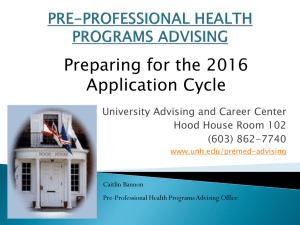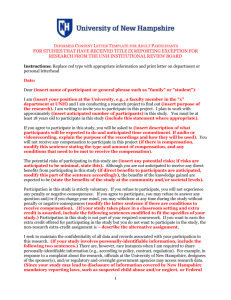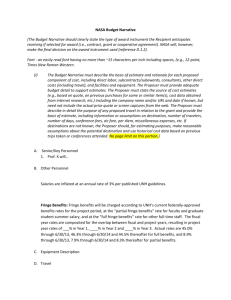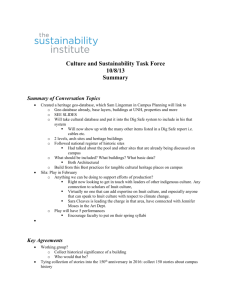September Minutes - Sustainability Institute
advertisement
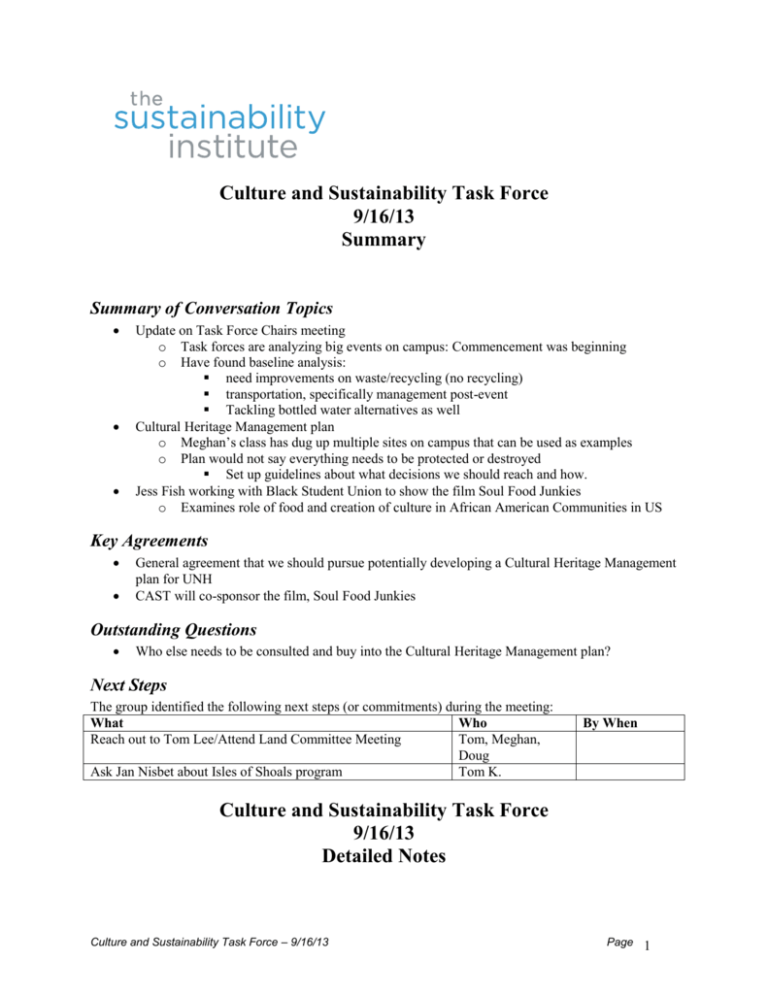
Culture and Sustainability Task Force 9/16/13 Summary Summary of Conversation Topics Update on Task Force Chairs meeting o Task forces are analyzing big events on campus: Commencement was beginning o Have found baseline analysis: need improvements on waste/recycling (no recycling) transportation, specifically management post-event Tackling bottled water alternatives as well Cultural Heritage Management plan o Meghan’s class has dug up multiple sites on campus that can be used as examples o Plan would not say everything needs to be protected or destroyed Set up guidelines about what decisions we should reach and how. Jess Fish working with Black Student Union to show the film Soul Food Junkies o Examines role of food and creation of culture in African American Communities in US Key Agreements General agreement that we should pursue potentially developing a Cultural Heritage Management plan for UNH CAST will co-sponsor the film, Soul Food Junkies Outstanding Questions Who else needs to be consulted and buy into the Cultural Heritage Management plan? Next Steps The group identified the following next steps (or commitments) during the meeting: What Who Reach out to Tom Lee/Attend Land Committee Meeting Tom, Meghan, Doug Ask Jan Nisbet about Isles of Shoals program Tom K. By When Culture and Sustainability Task Force 9/16/13 Detailed Notes Culture and Sustainability Task Force – 9/16/13 Page 1 Participants Ruth Abelmann, Residential Life Nelson Barber, Paul College Jackie Cullen, Sustainability Institute at UNH Kristina Durocher, UNH Museum of Art, El Farrell, Sustainability Institute at UNH Burt Feintuch, Center for Humanities Jessica Fish, Race and Ethnic Studies Meghan Howey, Anthropology, UNHSI Faculty Fellow Tom Kelly, Sustainability Institute at UNH Sheila McNamee, Communications Paula Salvio, Education, Sustainability Institute at UNH faculty fellow Stephen Trzaskoma, Classics Facilitator: Meghan Howey, Jessica Fish Content Manager: Jackie Cullen Update on Meeting with Task Force Chairs UNH Events: moving toward sustainable events One of the issues that came up that might be a space for CAST to get in on is waste. Task force chairs collected data at 2013 commencement to better understand how sustainability is reflected in public events at UNH o Effort the TF’s were talking about on events. Do large-scale events at UNH reflect the values of campus? o Waste was one of the things but were looking across a range of things. Idea was to take commencement, not make any interventions, just try to characterize what happens and use it as a baseline to think about how could it more robustly communicate values. Waste issues, transportation issues, also trying to look at messaging What does it say about the University as a whole Speakers, what do they reflect? o One of the goals was to develop better guidelines UNH events A little complicated because of how many different departments are involved. Emory has an event certification process. Not acceptable if there’s no recycling at U Day Was interest from other chairs that this is an area where all four can collaborate. o Does not seem to be low-hanging fruit Low-hanging fruit is never the fruit you want to eat anyway (Paula) o Something to keep on our radar and keep coming back to. Introduction of TF Ambassador Sustainability Institute at UNH started a program to pair a student ambassador with each of the four UNHSI task forces Found us Ann Steeves, Jessica and her met last year during one of the reading groups, in class today but will be with us the rest of the year, graduating in May, Health Management and Policy dual Major with EcoG. Will be working with her to set up a project for URC and blogging for Sustainability Institute at UNH blog, sustainableunh.org Ambassador idea came from a student the year before last. Culture and Sustainability Task Force – 9/16/13 Page 2 o Students applied for position, commit to come to task force meetings and put in time on projects, blogging, communicating out to other students what’s going on with their task force and subject area. Short Term Projects Cultural Heritage Management Plan Seems like it would be a good fit. So many broad things that we could tackle, tried to think about smaller, achievable and tangible things that can be achieved this semester/this year. Think it’s really important and could be really meaningful for this group to do. UNH has a fourfold model of sustainability and has always included culture One connection is tangible cultural heritage o UNESCO’s definition: Tangible heritage includes buildings and historic places, monuments, artifacts, etc., which are considered worthy of preservation for the future. These include objects significant to the archaeology, architecture, science or technology of a specific culture. o For more: http://www.unesco.org/new/en/cairo/culture/tangible-cultural-heritage/ Thinking of UNH, what kind of tangible things are there, how to we protect our cultural resources, just like the natural resources. Can only sustain a certain level of change before they are destroyed. Campus archeology class, a lot of interesting sites on campus. o Have a lot of land, just on main campus found Barracks when this was an army training camp in WWI, 500 campuses were training campus, ours had the most physical transformation during that process. We were a vocational school . o All the men were enlisted, brought in people from NY. o Train station from 1851, first station in heart of campus, one of first on Boston/Maine line. Is a bigger site, whole field of space that was uses Can we think about the pool o Students talk about the pool, automatic response is it belongs to UNH, we need a bigger gym o Meghan has had people approach her about the pool. o It is a cultural heritage resource, one of a kind o How to come to some sort of common vocabulary o Right now it’s for or against and simplistic advertising o Sentimentality that circulates, very expensive project o Do we sustain a tangible resource, or not? What criteria do we use to reach that? o Students bring up the pool every class Plan would not say everything needs to be protected or destroyed o Set up guidelines about what decisions we should reach and how. New England Center another example of architectural “gem” Question: are you (Meghan) archiving information from classes? o Special collections are also on campus, pictures, o Doug will give us name later Support making a plan, but don’t want people to think that we aren’t already doing some of this o Don’t currently have a delineated plan/process o Will be helpful to have something that says “this is the way we should be doing this” o Be more rigorous in the way that we collect information Best example is Michigan State Culture and Sustainability Task Force – 9/16/13 Page 3 o o o o o o Campus archeology program, president gives them $80k per year for program Hire a grad student, archival research, full time Any development an archeologist is called for survey and evaluation of potential impact Blog and twitter, undergrad interns Pay students that are surveying projects People in facilities say that they think working closely with that group makes their work more meaningful and have enjoyed having them involved in the process o Program grew very organically o Goal isn’t for UNH to give that much for this program but a great model to strive for and look at. o Compelled MS to do program because of land-grant o Dug first dorm at MS and a lot of alumni donated. Pettee House, great grandson saw that they were digging and came out, showed pictures, o Element of alumni outreach and engagement, potential funding. Other places have done more with above ground o Alabama, Arkansas have done a lot with historical buildings What do we value, when do we make those hard decisions about heritage value vs. UNH’s wants/needs for campus Would UNH Manchester be included? o Would be interesting and important to do o Huge wealth of archeological resources o Brown Center has Garrison o Adams Point is major Native American site. (Jackson Lab) One possibility is to create an institute for high school students or teachers. o Summer dig, getting teachers involved o Also a way to bring strong students to UNH as freshmen, o Potential pre-freshmen project o Variations, SMART Program, high school kids, 9-12 grades. o Because students aren’t getting a lot of that in school now would be a great and unique program to offer to them Public Outreach as a value around heritage as well o Learning, education Other lands UNH owns across the state? o Is a land committee that has this information collected o Surveys have been done, not cultural o Meghan would like to ID sites she’s found with a GIS map of core campus Doug: GIS capability/commitment o Can it be layered in? o All lands that we know of in the state of NH are mapped to varying degrees of accuracy o Durham, Lee, Madbury, can zoom in closer to campus o Can show w/in the lands what the highest sensitive areas are culturally speaking. Pool might be high priority, might not be o GIS has infinite range, use to keep track of utilities, etc. Also has accessibility map, tree inventory, Need creation of a document o Also needs to be a piece that backs up that what the document lays out can be accomplished o Enough of a case for a few thousand put aside each year for work study or grad students to survey and build database on what we have on UNH lands Culture and Sustainability Task Force – 9/16/13 Page 4 Think we’d be in a good position with Lisa as provost to ask for that, has been supportive of archeology class and has worked with the Native communities we work with at UNH They have a lot of concern about the digging that goes on on campus. Where do artifacts go? o Curated and kept in a lab. Meghan manages artifacts, hers being added to what already exists on campus. o Kept in Huddleston, archeology lab What are requirements for putting up a new building (for example) o Varies depending on the source of funding o Fed grant money have specific rules about what has to be done State div of historic resources oversees that process o State rules and regulations much more “as you feel the need to do it” State agencies have certain requirements UNH is in an area where sometimes we’re a state agency, sometimes not UNH system, not just UNH, haven’t fallen underneath that Historic resources div. would disagree Has been done on informal basis Have had discussions already about the pool, other projects Going forward o Good that Doug is here, as this goes forward there is a clear sense of communication with facilities and others who will be impacted by it. o Other stakeholders that should be involved from beginning Two different land committees: Land Advisory committee = those who use and control the land Athletics, recreation, Natural Resources, etc. Tom Lee is chair Land committee reports to real property committee o Structure comes out of being approached by Seacoast United for a regional soccer facility, were going to do it on Moore field, agricultural field used by COLSA o Discussions had advanced without engagement of an adequate representation of UNH, community organized quickly and it all came to a halt o Administration created structure out of that. o People who use it can evaluate and discuss, o Same time: trustees wanted to sell some of the land across the state This can be another layer in that process Valuable for overall community to understand when decisions are made that there are committees where these things are reviewed, can help to make that clearer What do we want to do as a task force and when we want to instead of creating structure, want to affect the work already being done. Certain workflows to change to allow for more inclusion of sensitive areas. Analogous is Aesthetics committee and public art guidelines Another side of this, about the work of Meghan’s students and grad students. Steve T. worked in college for an archeology dept. Did tests on sites before any digging went on. Campus paid for it. o Culture and Sustainability Task Force – 9/16/13 Page 5 Miniscule in terms of construction to send three students out assess the site. DigSafe is only thing done now o Conversation in a broader setting to ask if WWI artifacts matter to us to preserve. o Seems that the task force should call for the writing of the guidelines with the rank and values, but bring in the others on the land committees to get the agriculture, forestry pieces and others. Separate piece is funding for the outreach, where we can then work with high school groups and others. Land advisory committee has all of those players, could reach out to Tom Lee to get on the agenda to introduce the idea. o Do we value the Durham culture, sites that are not UNH historical sites Brings up what we think of as the line that’s Durham vs. UNH Bring very upfront about that. Almost no students doing research in Durham itself. New England Center o Experienced decisions made behind closed doors, not really a dialogue at play that had meaning o If there’s a policy, it would assure there’s a place for all members of the community to have dialogue o Also has to do with continuity, if faculty are stepping in for a short period of time and leaving, how to o NEC would be named in Meghan’s rapid appraisal of sensitive areas Ecosystem Task force has town engineer on committee o Town and university actively engaged in a plan to protect watershed from nitrogen point of view. Great to start with Durham o As developing value criteria, if use is one of them, what is the use for the people that are up north/in other areas Good use of task force time? o Consensus that it could help task force flesh out what we’re talking about when we say cultural sustainability o Also help with the issue of how to become effective stewards of the past o Gives ability to connect with other land preservation groups out there, landscape not just historical societies o Sustainability recognized to be built on intergenerational, this helps to tie in past generations and extends it beyond only thinking of the future o Looking at only the last 5, 7 years is nowhere near enough to look at a problem effectively. Early conversations about campus sustainability, went back to Petrulius o Firmness, commodity and delight. (LOOK UP…) o Allowed to see broader context than purely energy efficiency Public o Allow for public interpretation about what the values and places are o Library museum wants to do an exhibit on what’s been done so far. Put up marker, sites on campus, walk by it everyday but don’t know that it’s there. Even if pool is gone, putting up a marker Setting up an app to use for student tours etc. that can show you what the sites on campus are that we want to mark. o App called “more than a map”, list black history sites. Culture and Sustainability Task Force – 9/16/13 Page 6 o o Something to that effect. Project in London. Turned camera on to show the real-time space, aka a tube entrance photo superimposed over what was in front of it. Sound, environmental artist, Halsey Burgund two projects http://halseyburgund.com/ o One collecting sounds of the ocean, sonar sounds, people’s conversations about the oceans, interweaving the two o Oral History walking tour of U Colorado campus, tied to GPS, recollections of sites. Can dig deeper into audio. Where to start o Meghan and someone else go to Land Advisory Meeting to share idea o Doug and Tom, on committee, can reach out to Tom Lee directly, o Draft prepared, parse out from notes a series of next steps o Need to figure out everyone else that needs to be consulted and buy-in to idea o SARC, space allocation resources committee, VP level committee, faculty and student representation, broad decisions about projects done and ways we think about projects in the broadest sense Does this have to go to that group or not, talk to Lisa first? o Do the basic due diligence before going to higher o Durham Historical Society, when do they come into the process o Museum, communications/Marketing, Library, history dept. Masters, cert. in Museum studies, o Working group to start hashing out drafts, build plan and build ground work for public outreach, other best practices o People have ties to UNH, “should UNH be around in 100 years” will say yes Something about this as an aggregator, has an overt mission that is self-reflective Bringing in students, whether through oral history projects or others, A lot of curricular opportunities o Dale Valena and Kristina giving walking tours on campus. Staff and faculty show, museum, Good idea to tape record a tour, could produce a script that could eventually be used as a recording. Wanted to focus on walking, connect different places on campus, whether for people in Durham or those in o Tree inventory still being kept up in facilities Soul Food Junkies Jess Fish working with Black Student Union to show the film Soul Food Junkies o Examines role of food and creation of culture in African American Communities in US o Food justice addressed especially for people of color in Urban Areas o In conversations with BSU has been a lot of interest in showing the film, great way for task force to partner with a student group. A lot of other student groups interested in seeing/showing the film Not getting a lot of food justice info o With task force approval will Sustainability Institute at UNH/Task force could kick in $100 o Dining services, tying it into food in the dining halls o Can tie in with the Food Task Force o In work done with DSC groups, students relate more to student led dialogue, Approached a couple students, screen film beforehand, lead discussion after film Diverse group of students would be on panel Culture and Sustainability Task Force – 9/16/13 Page 7 Other Ideas from TF members A lot of action right now around Isles of Shoals, program has been run joint Cornell/UNH, moving towards UNH, exec director will be hired. A lot of relevant stuff to what we’re talking about o Asked Jan Nisbet if any cultural heritage being looked at, no o Not an easy thing to keep running o Have interviewed for exec director position, invite that person to be part of task force o Tom talk to Jan about that site if it will be UNH lands. Long Term Projects Collaboration with other TF’s on waste? Student Ambassadors, use them as a conduit. Mission Statement? Holding off for now, everyone in agreement Other ideas from TF members Culture and Sustainability Task Force – 9/16/13 Page 8
